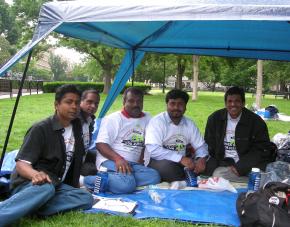On hunger strike outside the White House
By
WASHINGTON, D.C.--Twenty-four Indian guest workers launched a hunger strike outside the White House May 14, protesting the slave-like conditions they endured working at the Signal International shipyards in Pascagoula, Miss.
The workers each paid $20,000 to a recruiting agency for work in the U.S., often selling their homes in India and taking out loans on the promise of substantial returns from the "American dream." But on the Gulf Coast, they found a nightmare.
The workers were crammed into a trailer and locked in at night, released only for work and for sporadic trips to Wal-Mart for necessities. They were each charged $1,050 for these atrocious living arrangements.
The workers are on hunger strike not only to put pressure on Signal to end its involvement in labor trafficking, but to protest efforts to deport them.
"After all this, we are the ones who are being treated like criminals," the hunger strikers said in a statement. "We are told we must turn ourselves in for deportation procedures before we can participate in an investigation into our case. We know this is what Signal wants--for us to disappear back to our homeland to drown in an ocean of debt. But they cannot silence us so easily."

On day three of their hunger strike, under a blue tarp outside the White House, they were hopeful, but worried. They're concerned about their families in India, who will be saddled with paying back loans if no action is taken against the predators who took advantage of them.
But they workers are also optimistic because local and national advocacy groups have rallied around their cause.
D.C. Jobs with Justice (JwJ), the Southern Poverty Law Center and the AFL-CIO are all helping this struggle with petitions, legal advice and solidarity actions planned throughout the course of the hunger strike. JwJ, for instance, is attempting to link the Indian guest-workers' struggle with that of the city's day laborers.
For their part, the guest workers understand that Signal is using easily exploited foreign workers in place of native residents, and they've offered job training to Gulf Coast residents who are still displaced and impoverished by Hurricane Katrina.
About 30 more Signal workers are scheduled to join the hunger strike in two waves on May 21 and May 28.
"We are conducting this hunger strike for one thing: the chance to help justice be served," the hunger strikers said in their statement. "We know that if we remain silent the way Signal wants, our brothers and nephews and neighbors will be next. We have sacrificed everything we had, so now we are laying down our lives."


